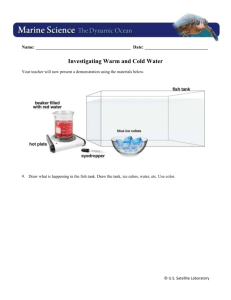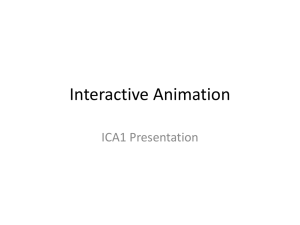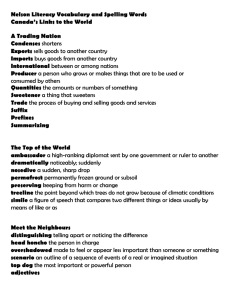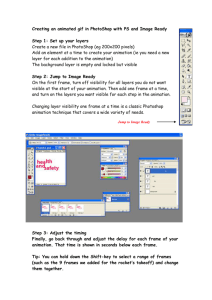ppt (with animations) - Computer Science Division
advertisement
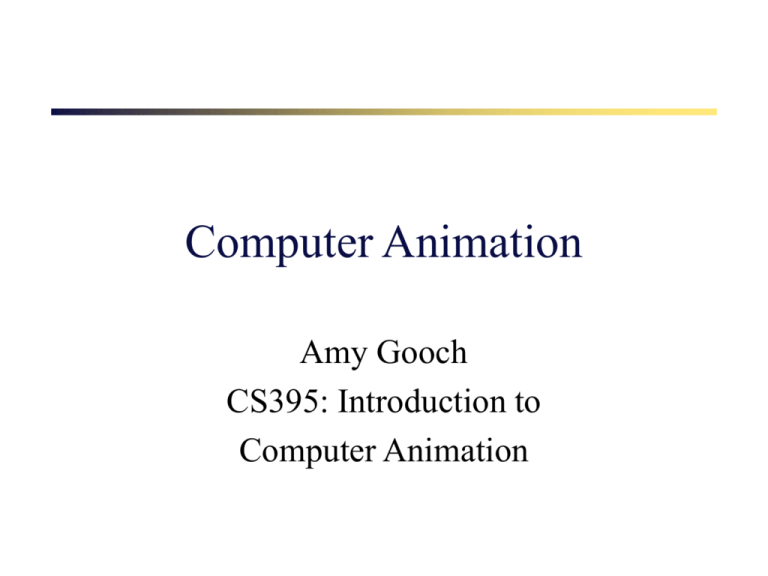
Computer Animation Amy Gooch CS395: Introduction to Computer Animation Animation • Animate = “to give life to” • Specify, directly or indirectly, how ‘thing’ moves in time and space • Tools Two main categories • Computer-assisted animation – 2D & 2 1/2 D – Inbetweening – Inking, virtual camera, managing data, etc • Computer generated animation – Low level techniques • Precisely specifying motion – High level techniques • Describe general motion behavior Low level techniques • Shape interpolation (in-betweening) • Have to know what you want High level techniques • Generate motion with set of rules or constraints – Physically based motion http://www.cs.berkeley.edu/~job/Projects/SoundGen/video.html Abstraction Animator colors each pixel to Tell computer to “make movie about a dog” Perception of Animations • Playback rate • Sampling or update rate • TV: 30 images/second • Sat Morning Cartoons: – 6 different images per second – Each image repeated five times Heritage of Animation • Persistence of vision: discovered about 1800s – Zoetrope or “wheel of life” – Flip-book Heritage of Animation • Camera to make lifeless things move – Meleis 1890 using simple tricks – Emil Cohl (1857-1938, French) Heritage of Animation – J. Stuart Blackton (American) • Meet Thomas Edison in 1895 – Combine drawing and file: “The Enchanted Drawing” – Six years later: “Humorous Phases of Funny Faces • Animated smoke in 1900; First animated cartoon in 1906 QuickTime™ and a YUV420 codec decompressor are needed to see this picture. QuickTime™ and a YUV420 codec decompressor are needed to see this picture. Heritage of Animation • First celebrated Animator – Winsor McCay (American) • Little nemo • Gertie the Dinosaur (1914) QuickTime™ and a YUV420 codec decompressor are needed to see this picture. Heritage of Animation • First major technical development – John Bray /Earl Hurd (1910) – Translucent cels (short for celluloid) in compositing multiple layers – Use of grey scale (as opposed to B&W) – Color short in 1920 John Randolph Bray'sColonel Heeza Lair. Heritage of Animation Out of Bray’s studio • Max Fleischer (Betty Boop,, Popeye) – Patented rotoscoping in 1915 – Draing images on cells by tracing over previously recorded live action • Paul Terry (Terrytoons: Mighty Mouse) • George Stallings(?) • Walter Lantz (Woody Woodpecker) Heritage of Animation • Animation as an art form – First animated character with personality • Felix the cat by Otto Messmer (1920s) • Force to reckoned with – Sound and Walt Disney Disney: Animation as an art form • Innovations – – – – – Story board to review story Pencil sketch to review motion Multi-plane camera stand Color (not first to use color) Sound! • Steamboat Willie (1928) Multiplane Camera • Move scene layers independently of camera http://www.geocities.com/SunsetStrip/Club/9199/Animation/Disney_Multiplane.html MGM and Warner Brothers, etc. Other Media Animation • Computer animation is often compared to stop motion animation – Puppet animation • Willis O’Brian (King Kong) • Ray Harryhausen (Might joe Yong, Jason and the Argonauts) QuickTime™ and a YUV420 codec decompressor are needed to see this picture. Other Media Animation – Claymation – Pinhead animation – Sand animation • Physical object is manipulated, image captured, repeat Hierachy of film/animation Presentation Act Scene Shot Frame Production of Animation • • • • • • • • • Preliminary story Story board Detailed story Key Frames Test shot Pencil test Inbetweening Inking Coloring Computer Animation basically follows this pipeline Computer Animation as Animation • Lasseter translated principles of animation as articulated by two of Nine Old Men of Disney to computer animation – Lasseter is conventionally trained animator • Worked at Disney before going to Pixar • Many celebrated animations • Knick-knack (oscar-winning) Short History of Computer Animation In Research labs • NYIT Still frame from Gumby animation by Hank Grebe and Dick Lundin, 1984. In Research Labs • University of Utah – Films on walking and talking figure – Animated hand and animated face (1972) • University of Pennsylvania – Human figure animation (Norm Badler) • Cornell University – architectural walk-throughs (Don Greenberg) History of Computer Animation • 1974: Hunger by Rene Jodoin and Peter Foldes – 2.5D system, object interpolation Current activity Centers • • • • • • • • • • • • University of Toronto's Computer Science Department Simon-Fraser University's Graphics and Mulitmedia Research Lab Georgia Tech's Graphics Visualization and Usability Center Brown Computer Graphics Group Ohio State University's ACCAD Ohio State University's Department of Computer and Information Science George Washington University Graphics Group UC San Diego's Department of Computer Science and Engineering University of North Carolina's Computer Science Department MIT's Media Lab MIT's Laboratory for Computer Science University of Wisconsin at Madison History of Film & Video • Companies – – – – – – – Mathematical Applications Group, Inc. (MAGI) Information International Inc. (III, or Triple-I) Digital Production Digital Effects Image West Robert Abel and Associates Cranston-Csuri. Current Companies • • • • • • • • • • • • • • • • • Pixar Industrial Light and Magic (ILM) Pacific Data Images (PDI) Disney Xaos Rhythm & Hues Digital Domain Lamb & Company Metrolight Studios Boss Film Studios deGraf/Wahrman R/Greenberg Associates Blue Sky Productions Sony Pictures Cinesite Imageworks Apple…. . Animations that paved the way Pixar • Luxo Jr. (1986) – first computer animation to be nominated for an Academy Award • Red's Dream (1987) • Tin Toy (1988) – first computer animation to win an Academy Award • Knick Knack (1989) Early CG in film – Future World (1976) – Star Wars (1977) • Lawnmower man (1992, Xaos, Angel Studios) – Hollywood’s view of VR – Tron (1982, MAGI) • Supposed to look like a computer – The Last Starfighter (1984) • Use CG in place of models – Willow (1988, ILM) • Morphing video • First digital blue screen matte extraction – Howard the Duck (1986, ILM) • First wire removal – The Abyss (1989, ILM) More early CG in film • Jurassic Park (1993, ILM) – Forest Gump (1994, Digital Domain) • Insert CG ping pong ball – Babe (1995, Rhythm & Hues) • Move mouths of animals & fill in background – Toy Story (1995, Pixar & Disney) • First full length fully CG 3D animation Early CG on TV • Reboot (1995, Limelight Ltd. BLT Productions) – Similar intention of “inside computer” – First fully 3D Sat. morning cartoon • Babylon 5 (1995) – Routinely used CG models as regular features • Simpsons (1995 PDI) Resources • Milestones of the animation industry in the 20th Century – http://www.awn.com/mag/issue4.10/4.10pages/ cohenmilestones.php3 • http://www.factindex.com/a/an/animation.html#History%2 0of%20Animation • Brief History of NYIT Computer Graphics Lab http://www2.cs.cmu.edu/~ph/nyit/masson/nyit.html Resources (con’t.) • Timeline from Brown Animation class – http://www.cs.brown.edu/courses/cs229/animTi meline.html • In-betweening – http://alpha.luc.ac.be/~lucp1112/research/CA20 01/results.html Credits/Resources • Rick Parent – http://www.cis.ohio-state.edu/~parent/book/Intr.html – • http://www.cis.ohio-state.edu/~parent/book/outline.html America’s Story – http://www.americaslibrary.gov/cgi-bin/page.cgi/sh/animation/blcktn_2 Character Animation • • • • Control motion of articulated limbs Skeletal-muscle-skin models Facial animation Representation and Animation of surface detail – Hair – Clothes Utah CG History • http://silicon-valley.siggraph.org/text/MeetingNotes/Utah.html

